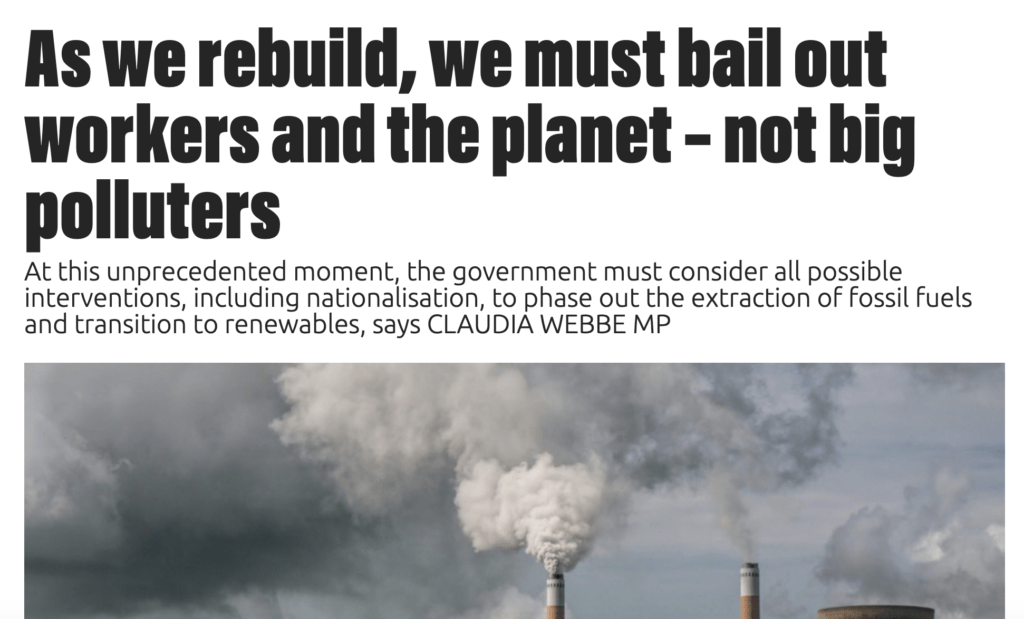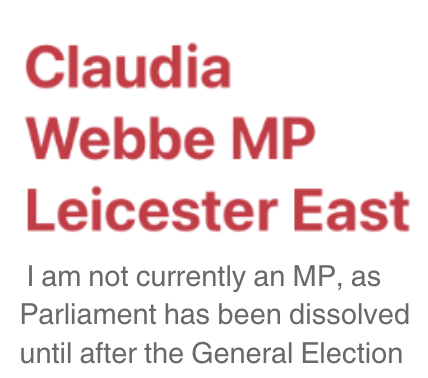
As we rebuild, we must bail out workers and the planet-not big polluters
By Claudia Webbe MP
At this unprecedented moment, the government must consider all possible interventions, including nationalisation, to phase out the extraction of fossil fuels and transition to renewables, says CLAUDIA WEBBE MP
THE past week has seen a surge of climate activism, which includes organisations like Extinction Rebellion resuming their unique brand of protest by urging MPs to back the Climate and Ecological Emergency Bill.
I commend everyone who is peacefully protesting to save our planet.
I am proud to support the Climate and Ecological Emergency Bill, which as a Presentation Bill does not involve a debate or a vote in Parliament, but is an important way of drawing attention to an issue that requires a change in the law.
And there is no issue which requires a drastic change more than our approach to the climate crisis.
The flash floods, extreme rainfall, deadly landslides, heatwaves and wildfires we have seen over recent years make clear that climate breakdown is not a distant threat — but is happening here and now.
The World Meteorological Organisation found that the 20 warmest years on record have been in the past 22 years.
More than one million species are at risk of extinction through climate change.
Human-caused climate change has dire implications for people, animals and the environment.
Yet while Parliament declared an environment and climate emergency in May last year, the Conservatives are simply not responding with the urgency the situation requires.
I recognise that the government has legislated to bring all greenhouse gas emissions to net zero by 2050.
Yet not only is this timeline perilously unambitious, but the government is not on track to meet it.
The Committee on Climate Change warned in 2019 that Britain is not on course to meet its existing legally binding targets for 2023 to 2032.
Not only this, but the government has continued to give oil companies further tax breaks as recently as December 2018.
This week, I had the opportunity to question Tony Abbott during an evidence session of the foreign affairs committee.
The former prime minister of Australia, who was subsequently appointed as a British trade ambassador, argued in December 2019 that the world is “in the grip of a climate cult,” and that there was also something called the “emissions obsession” driving climate policy.
What does it say about Britain’s future, and commitment to tackling the climate emergency, when the government chooses to appoint Abbott, a climate change denier as a trade adviser?
Despite what Abbott claims, climate change is real — and is already here. The 2018 Intergovernmental Panel on Climate Change found that to prevent global temperatures from rising by more than 1.5°C above pre-industrial levels — seen by scientists as a tipping point past which climate disasters will be locked in — then oil and gas production has to fall by 20 per cent by 2030.
I am gravely concerned that, if the fossil fuel companies are left to their own devices, crucial targets such as these will be missed.
To give one example, ExxonMobil is internally projected to extract 25 per cent more oil and gas in 2025 than in 2017.
Oil companies like Exxon and Shell knew that their extractive industries were causing climate change in the 1980s, but instead of informing the public they funded climate change denial and lobbied against environmental policies.
A 2017 study in the scientific publication World Development found that worldwide fossil fuel subsidies amounted to $4.9 trillion in 2013.
It estimated that eliminating those subsidies would have cut global carbon emissions by 21 per cent and air pollution deaths by over half.
It is vital that these subsidies are ended, and that government bailouts are subject to stringent commitments to workers’ rights, tax justice and rapid decarbonisation.
Without immediate government intervention, the urgent action required to preserve a habitable planet will be too slow.
This will cause unimaginable disruption and could cost millions of lives, most immediately and sharply in the Global South — countries which have contributed the least to climate change.
The current crisis has demonstrated that we are only as secure as the most precarious among us.
It has revealed the power of the state to transform industries, provide a safety net and tackle injustices.
It has shown that profound social and economic change really is possible.
The lockdown and its consequences have changed many people’s way of working and opened up the possibility of work and society being organised differently.
Investing in the local and creating streets for people and the habitat must be high on our agenda.
At this unprecedented moment, the government must consider all possible interventions and regulations, including nationalisation, to phase out the extraction of fossil fuels and transition to renewables as soon as scientifically possible.
It must be the big polluters and corporate giants who bear the costs, not ordinary people.
This will require an unprecedented effort, and it is vital that the protection of all workers and communities is guaranteed during the transition to renewable energies.
The concurrent mass creation of well-paid, unionised jobs would be vital in the mass re-employment which will be required after the coronavirus crisis.
It is crucial that the government seizes the once-in-a-generation opportunity presented by the need to rebuild in the aftermath of the pandemic to rapidly decarbonise our economy through a green recovery.
We need that plan now so that we can invest in the green industries of the future, put people back to work in good, green jobs across the country and support workers and communities as we make the transition to a low-carbon and socially just economy.
Ultimately, as we rebuild, we must bail out workers and the planet — not big polluters.
Claudia Webbe MP is the member of Parliament for Leicester East. You can follow her at www.facebook.com/claudiaforLE and twitter.com/ClaudiaWebbe


